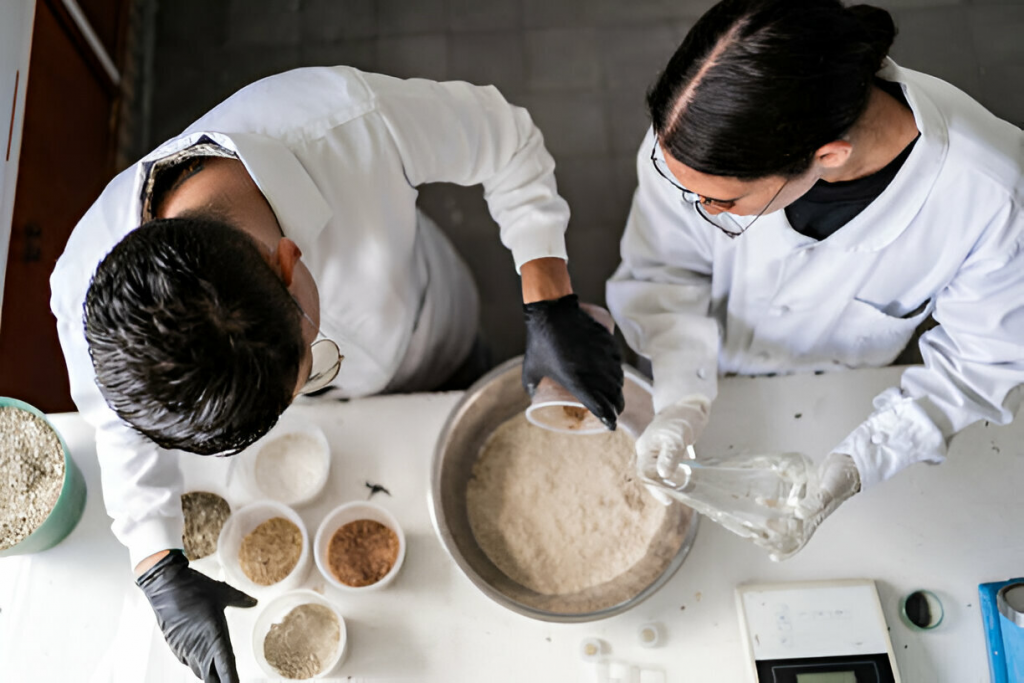Bringing a new food product to market is more than just having a great formulation or a brilliant idea.
It requires understanding ingredient sourcing, food safety, consumer trends, and the manufacturing process—not to mention scalability,regulatory compliance, and cost management.
And that’s where even experienced food R&D teams, technologists, and manufacturers get stuck.
A food scientist may know everything about formulation but struggle to make their product cost-effective and scalable. An entrepreneur may have a strong vision but lack the technical knowledge needed for food safety and product feasibility.
This is why food product development training is essential. It helps you bridge the gap between science, business, and market success—resulting in more efficient processes, lower risks, and better products.
The gap between food science and market success
Food science is a highly technical field. It focuses on formulation, shelf stability, food chemistry, and safety regulations. But knowing how to create a technically sound product doesn’t automatically mean it will succeed in the market.
For example:
- A food scientist might develop a functional food with amazing nutritional benefits, but if it doesn’t taste great, no one will buy it.
- A manufacturer might have a fantastic concept for a premium snack, but if the cost of production is too high, it won’t be sustainable.
95% of new consumer products fail within their first year. Many of these failures could be avoided with better product-market fit, stronger supply chain management, and scalable production strategies—all of which can be learned through food product development training.

Key challenges training helps solve
1. Product formulation vs. product feasibility
A product might be perfect in the lab but fail when produced at scale.
- Ingredients behave differently when you move from small-batch to mass production.
- The cost of certain ingredients may make a product too expensive for the target market.
- Formulations may require stabilizers or preservatives to maintain shelf life.
Training helps you create products that are not just functional but also cost-effective and scalable.
2. Ingredient sourcing and supply chain management
One of the biggest hurdles in food product development is finding reliable suppliers and managing costs.
- How do you choose cost-effective, high-quality ingredients?
- How do you ensure consistent supply to avoid production delays?
- What are the best backup sourcing strategies?
Training covers how to work with food manufacturers and ingredient suppliers to create a smooth supply chain. (Dive deeper into our supplier sourcing guide for more insights.)

3. Regulatory compliance and food safety
Food businesses are highly regulated, and not following food safety standards can result in fines, recalls, or worse, a damaged reputation.
Training ensures that you:
- Meet food industry regulations in their region.
- Follow food safety protocols to avoid contamination risks.
- Understand labeling laws and packaging requirements.
This is critical for both food scientists and brands—because a product that doesn’t meet compliance can’t be sold.
4. Scaling from small batches to mass production
Scaling up isn’t just about producing more—it’s about keeping quality, taste, and texture consistent.
Some common scaling problems:
- Texture changes when ingredients are produced in bulk.
- Packaging failures that lead to shorter shelf life.
- Higher production costs that make the product too expensive for retail.
Product development training helps you anticipate and solve these issues before they become major roadblocks.
5. Understanding consumer trends and product-market fit
A good product is not enough—it needs to be something that people actually want to buy.
- What are the latest food trends (e.g., plant-based, functional foods, clean label)?
- How do you position your product for the right target market?
- What role does branding, packaging, and storytelling play in success?
Training helps you develop a clear strategy that aligns with consumer needs and market trends.

How training transforms R&D teams into market-ready innovators
Many food scientists and product developers are trained in science, not business. A strong food product development training program helps food scientists:
- Learn product management skills.
- Understand the business side of food innovation, including cost management and supply chain logistics.
- Gain practical knowledge of scaling production, ingredient sourcing, and marketing strategy.
This transition from technical expert to product developer is critical for those looking to move beyond the lab and into commercial food manufacturing.
Why food companies need more than just a great idea
Having a great product idea is not enough. Many food entrepreneurs struggle because they:
- Overlook food safety and compliance regulations.
- Don’t have reliable manufacturing partners.
- Misprice their product, making it unprofitable.
Without the right food product development training, these mistakes can lead to costly failures.
The Good Food Studio Food Product Development Course
Want to train your team to create successful, scalable food products?
At Good Food Studio, we specialize in helping you navigate food product innovation, from concept to commercialization.
Our structured food product development training course doesn’t just teach theory—it gives practical, hands-on experience in developing a market-ready food product.
Course objectives:
- Develop food product ideas into scalable, market-ready products.
- Master ingredient selection and supply chain logistics.
- Understand food safety laws and food legislation compliance.
- Learn the essentials of product management in the food industry.
- Explore innovative technology and packaging solutions.
Who is this for?
- Food R&D teams looking to develop innovative, market-ready products.
- Food technologists seeking deeper expertise in formulation, compliance, and scaling.
- Production managers & supply chain teams optimizing sourcing and cost efficiency.
- Food brands & manufacturers aiming to refine existing products and stay ahead of market trends.
How is it delivered?
- Online with a live instructor.
- Hands-on product development workshops.
- Expert-led modules on food product design, safety, and marketing.
Learning outcomes:
With our food product development training, you will:
✔ Learn how to turn an idea into a viable food product.
✔ Understand ingredient sourcing, food safety, and product formulation.
✔ Gain skills in product management and food business operations.
✔ Avoid costly production and scaling mistakes.
Register for our Food Product Development Course today. Get started here.